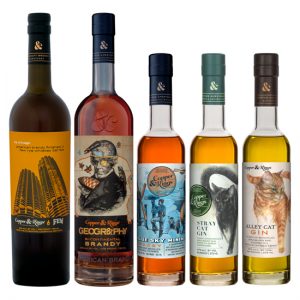Should All Wine Brandies Be Regulated?
 The term “brandy” refers to a spirit distilled from a fruit. This includes armagnac and cognac as well as a host of other wine brandies made from the indigenous fruits of the region from whence they come. The rigorous controls produced by the various regulatory bodies of each of the two main French wine brandies mean that their products will always be of a recognised quality. Unfortunately, this is not the case with grape brandies which have no rules to follow. Most are distilled on large commercial stills from unspecified grape varieties and sold after as little as one year’s ageing. In addition, their distillation range is not controlled, any grapes can be used and, in some cases, only the residue of the skins, pips and leftover flesh is distilled.
The term “brandy” refers to a spirit distilled from a fruit. This includes armagnac and cognac as well as a host of other wine brandies made from the indigenous fruits of the region from whence they come. The rigorous controls produced by the various regulatory bodies of each of the two main French wine brandies mean that their products will always be of a recognised quality. Unfortunately, this is not the case with grape brandies which have no rules to follow. Most are distilled on large commercial stills from unspecified grape varieties and sold after as little as one year’s ageing. In addition, their distillation range is not controlled, any grapes can be used and, in some cases, only the residue of the skins, pips and leftover flesh is distilled.
Many years ago, brandies were made in the wine producing regions, around Bordeaux and Saintonge, where wines were plentiful. The resulting wine brandies were of lower strengths, as the grape varieties used lacked acidity, and they failed to meet with the approval of the traders buying for their European customers. Only the wine brandies from the Charente, ie cognacs, were of an acceptable standard as rigorous quality controls were already in place. Over the years these regulations have been continued to be refined to meet increasingly higher standards.
It is right, therefore, that Lucien Bernard, in his discussion with Vinexpo News recently, seeks to create standards that enable us to compare the quality of all wine brandies. We see in the marketplace many cheap grape brandies poorly made with all manner of different grapes, methods of production and storage. We also see some brandies being passed off as cognacs. This is particularly true in China where counterfeit brandy is shipped in volume, mixed with small quantities of cognac and falsely labelled with respectable cognac producer’s names. Sadly, we will never be able to control these rogues and it is down to local governments to bring them under control.
However, there are also some very fine brandies on the market. Some of the Spanish brandies, made under the Solera system, a method which allows for the topping up of barrels which may have contained their famous sherries, are superb. Other good brandies, such as those from Greece and America and the Italian Grappa, also have production controls. Controls on the production of wine brandies is therefore both necessary and desirable as it will improve the quality of the brandies produced and reduce the rogues who seek to cash in on the market that deserves so much better. I’m with you Lucien!
